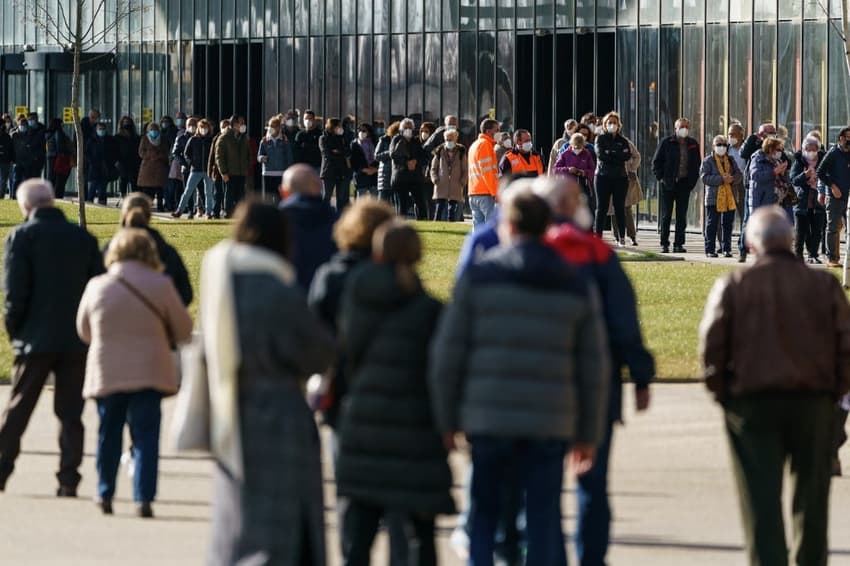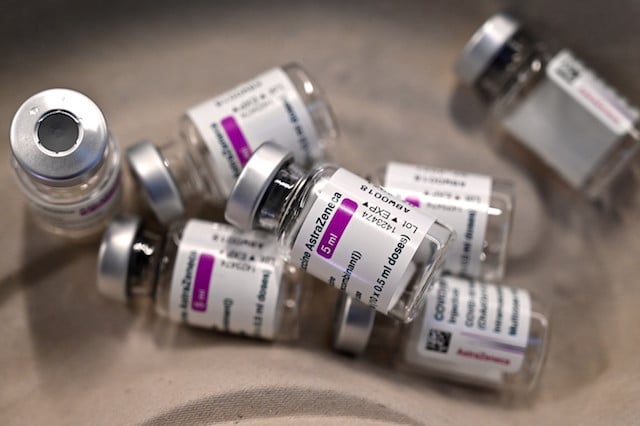UPDATE: What next for the 2 million people in Spain who had the first dose of AstraZeneca vaccine?

Due to side-effect concerns, the Spanish government has decided that the AstraZeneca vaccine is now only going to be given to those aged 60 to 69. But hundreds of thousands of other people in Spain who have received the first dose of this vaccine now find themselves in limbo.
On April 7th, the Spanish government announced it would reserve the AstraZeneca vaccine for those over 60, after an EU regulator said blood clots should be listed as a rare side effect of the jab.
This decision has left 23 percent of those who received at least one dose of the vaccine, in limbo.
The circa two million people who received just their first AstraZeneca dose, before this announcement was made, mostly includes key workers such as teachers, police, firefighters, physiotherapists and chemists, the majority of them under the age of 59.
Spain's Ministry of Health has confirmed that only 97 people received both AstraZeneca doses, which were spaced 10 weeks apart.
Those who received the first dose who are between ages 60-69 will still receive their second AstraZeneca vaccine, but what will happen to those who are younger?
Currently, there are two different scenarios that are being considered.
READ ALSO: Spain reserves AstraZeneca vaccine for those over 60
Will the AstraZeneca vaccine be combined with another inoculation?
A clinical trial conducted by the Carlos III Health Institute is currently taking place, with 600 participants in two hospitals in Madrid, two in Barcelona and one in Bilbao to determine what should be done.
Director of the Institute Raquel Yotti announced that those taking part in the trial will be receiving a second dose of the Pfizer vaccine instead of the AstraZeneca one.
The volunteers were all given their first AstraZeneca vaccine nine weeks previously and out of these, 400 of the participants will receive their second dose of Pfizer.
“This will assess the impact of the intensification of the immune response when the second dose is the Pfizer one,” explained Jesús Antonio Frías, coordinator of the Carlos III Health Institute’s clinical research network.
If the trial is successful, this same method could be carried out on all of the roughly two million people in Spain, who have only received one dose of the AstraZeneca vaccine.
The study, which has been named CombiVacs, has already been approved by the European Medicines Agency.
The goal was to have the results of the trial as soon as possible, but on April 30th the Health Ministry announced that would delay the fate of those who had received just one dose by an extra four weeks.
This will take the amount of time between most people's doses from 12 to 16 weeks. The decision will give extra time for the results of the clinical trial.
However, the announcement has caused opposition from the Community of Madrid, as well as authorities in Castilla-La Mancha and Aragón.
Even experts from the Spanish Vaccine Commission have proposed that it would be safe to administer the second dose of Astrazeneca to those over the age of 40.

Will those who have been vaccinated with AstraZeneca receive only one dose?
The second option being considered is that those left in limbo won't receive a second dose at all.
It is believed that even a single dose of AstraZeneca provides 70-75 percent protection against Covid-19, according to the news site OK Diario.
Will Spanish regions change their vaccine strategy?
The current government vaccine strategy in principle is to vaccinate those between 60-69 with AstraZeneca and those 70 and above with either Pfizer, Moderna or Janssen.
However, the government recently announced that it will give each autonomous community free reign on which vaccine it will use for the over 60s, depending on its availability.
The Health Ministry said: “Regions can vaccinate with all available vaccines” given that “there will be more than enough”.
AstraZeneca will not be used on a voluntary basis
The government however has categorically rejected the proposals of some regions, including Madrid and Catalonia, to allow those under 60 to be vaccinated with AstraZeneca on a voluntary basis.
It said that it does not seem appropriate to offer the vaccine to those under the age of 60, who wish to be vaccinated with AstraZeneca.
"Once again, we must remember that which vaccine people receive cannot be based on individual choice, but must be based on efficacy and different population groups," the Health Ministry wrote.
READ ALSO: Region by region: What foreigners in Spain should do to register for the Covid-19 vaccine
Comments
See Also
On April 7th, the Spanish government announced it would reserve the AstraZeneca vaccine for those over 60, after an EU regulator said blood clots should be listed as a rare side effect of the jab.
This decision has left 23 percent of those who received at least one dose of the vaccine, in limbo.
The circa two million people who received just their first AstraZeneca dose, before this announcement was made, mostly includes key workers such as teachers, police, firefighters, physiotherapists and chemists, the majority of them under the age of 59.
Spain's Ministry of Health has confirmed that only 97 people received both AstraZeneca doses, which were spaced 10 weeks apart.
Those who received the first dose who are between ages 60-69 will still receive their second AstraZeneca vaccine, but what will happen to those who are younger?
Currently, there are two different scenarios that are being considered.
READ ALSO: Spain reserves AstraZeneca vaccine for those over 60
Will the AstraZeneca vaccine be combined with another inoculation?
A clinical trial conducted by the Carlos III Health Institute is currently taking place, with 600 participants in two hospitals in Madrid, two in Barcelona and one in Bilbao to determine what should be done.
Director of the Institute Raquel Yotti announced that those taking part in the trial will be receiving a second dose of the Pfizer vaccine instead of the AstraZeneca one.
The volunteers were all given their first AstraZeneca vaccine nine weeks previously and out of these, 400 of the participants will receive their second dose of Pfizer.
“This will assess the impact of the intensification of the immune response when the second dose is the Pfizer one,” explained Jesús Antonio Frías, coordinator of the Carlos III Health Institute’s clinical research network.
If the trial is successful, this same method could be carried out on all of the roughly two million people in Spain, who have only received one dose of the AstraZeneca vaccine.
The study, which has been named CombiVacs, has already been approved by the European Medicines Agency.
The goal was to have the results of the trial as soon as possible, but on April 30th the Health Ministry announced that would delay the fate of those who had received just one dose by an extra four weeks.
This will take the amount of time between most people's doses from 12 to 16 weeks. The decision will give extra time for the results of the clinical trial.
However, the announcement has caused opposition from the Community of Madrid, as well as authorities in Castilla-La Mancha and Aragón.
Even experts from the Spanish Vaccine Commission have proposed that it would be safe to administer the second dose of Astrazeneca to those over the age of 40.

Will those who have been vaccinated with AstraZeneca receive only one dose?
The second option being considered is that those left in limbo won't receive a second dose at all.
It is believed that even a single dose of AstraZeneca provides 70-75 percent protection against Covid-19, according to the news site OK Diario.
Will Spanish regions change their vaccine strategy?
The current government vaccine strategy in principle is to vaccinate those between 60-69 with AstraZeneca and those 70 and above with either Pfizer, Moderna or Janssen.
However, the government recently announced that it will give each autonomous community free reign on which vaccine it will use for the over 60s, depending on its availability.
The Health Ministry said: “Regions can vaccinate with all available vaccines” given that “there will be more than enough”.
AstraZeneca will not be used on a voluntary basis
The government however has categorically rejected the proposals of some regions, including Madrid and Catalonia, to allow those under 60 to be vaccinated with AstraZeneca on a voluntary basis.
It said that it does not seem appropriate to offer the vaccine to those under the age of 60, who wish to be vaccinated with AstraZeneca.
"Once again, we must remember that which vaccine people receive cannot be based on individual choice, but must be based on efficacy and different population groups," the Health Ministry wrote.
READ ALSO: Region by region: What foreigners in Spain should do to register for the Covid-19 vaccine
Join the conversation in our comments section below. Share your own views and experience and if you have a question or suggestion for our journalists then email us at [email protected].
Please keep comments civil, constructive and on topic – and make sure to read our terms of use before getting involved.
Please log in here to leave a comment.